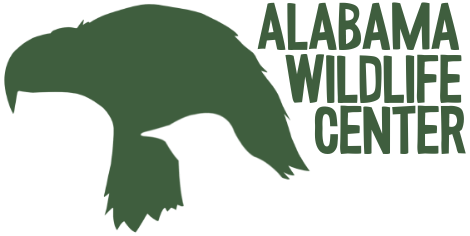Effective November 16th, 2022:
Until further notice, due to avian influenza, the Alabama Department of Conservation & Natural Resources has suspended the intake and rehabilitation of all species of waterfowl, shorebirds, wading birds, pelican, gull, corvid, and all raptor species, to include eagles, hawks, falcons, kites, harriers, osprey, vultures, and owls. From the Alabama Department of Conversation and Natural Resources: Members of the public seeking assistance with these species should be instructed not to touch the bird, to leave it where found, and to contact the Alabama Division of Wildlife and Freshwater Fisheries at 334-242-3469 with any concerns about HPAI.
WE ARE STILL PERMITTED TO ACCEPT ALL NATIVE SONGBIRDS.
If you have found an injured Heron, Duck, Gull, Pelican, or other water or shore bird, contact AWC for guidance.
Bird species like Herons or Gulls may cause injury to you if you attempt to capture. In those situations, AWC will try to help you get the bird to our headquarters at Oak Mountain State Park, just south of Birmingham, or, if you are closer to Pensacola, we will try to help you get the bird to the Pensacola Wildlife Rehabilitation Center.
If the bird is already confined, please keep it in a warm (not hot) quiet place, and call our Wildlife Help Line (205-663-7930, Ext. 1) immediately for further instructions.
If the bird is not yet in a safe container, the first step is to capture and confine the bird appropriately. Please call our Wildlife Help Line (205-663-7930, Ext. 1).
Be prepared to follow the capture guidelines given below. If you don’t feel able to capture the bird yourself, the Specialist will assist you in deciding what to do.
Never put a wild bird in a wire cage, because it will cause extra stress and may cause additional damage to the bird.
How to Capture & Confine a Water or Shore Bird
- ALWAYS wear thick leather (welding) gloves or other protective clothing when attempting to handle a large water bird.
- Most fish-eating birds use their long, sharp beaks as their primary defensive weapon. The beak is used with force and accuracy, and can penetrate through skin and muscle all the way to the bone. They may aim for the eyes.
- It’s a good idea to wear some extra padding, such as a heavy jacket, if you are going to have to pick up one of these birds. If safety goggles are available, wear them.
- Covering the bird’s eyes helps to calm it and also prevents it from seeing what you are doing. Hold a large towel or blanket in front of you like a blind, and slowly approach the bird. Drop the towel over the bird, and (wearing welding gloves) gently but firmly take control of the beak. Using your other hand, gently scoop the bird up with the wings folded against the body and support the bird’s weight by cradling the folded legs and body with your hand and arm. Do not let go of the beak, but remember that you may be covering the bird’s nostrils, and making it difficult to breathe. If possible, wedge several folds of the towel between the upper and lower beak to make it easier for the bird to breathe. Work quickly and gently.
- Immediately place it in a sturdy box of an appropriate size. Cardboard boxes make the best containers because the bird has the sense of being hidden inside the box and is not as aware of its surroundings. The darkness by itself has a soothing effect on most birds.
- Be sure to use some kind of bedding to support the bird in the box. Shredded newspaper, clean pine straw, an old t-shirt or other clothing can be used. A towel over the box will act as an additional buffer to stressful light and noise.
Box size must be appropriate to the size of the bird, especially when transporting long distances. Use the dimensions below as a guide:
- Small birds (Bittern, Hooded Merganser) – minimum size: 18″ x 18″ x 18″
- Medium birds (Gulls) – minimum size: 2′ x 2′ x 2′
- Large Birds (Herons, Geese, Pelicans) – minimum size: 3′ x 3′ x 3′
Do NOT give it any food or water (unless advised by AWC specialist to do otherwise).
If you are transporting a bird to our rehab clinic, please know we’re open every day of the year from 11:00AM to 4:00PM for bird admissions.
